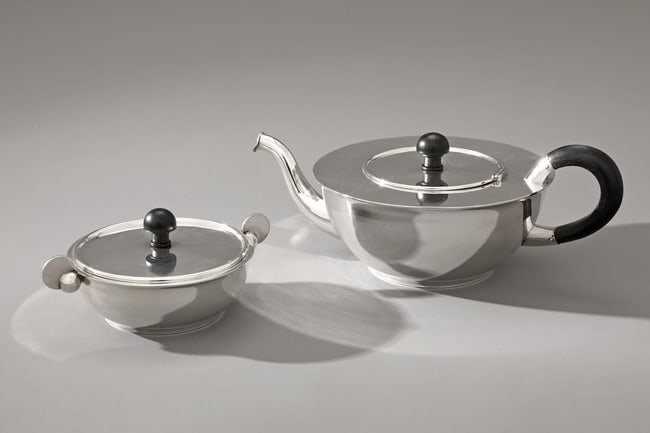Paula Straus, teapot and sugar bowl, model 13024, ca. 1926, 800 silver
Paula Straus
Peter Bruckmann & Söhne, Heilbronn
Teapot and sugar bowl. Model no. 13024. Parts of a service, by Paula Straus, designed for Bruckmann & Söhne, Heilbronn, around 1926. 800 silver, pressed and hammered. Knob and handle made of ebony. Teapot: 10 x 28.8 cm, D. 17.5 cm/Sugar bowl: 8 x 17.5 cm, D. 13.3 cm. 634 or 297 grams. Inscribed on the underside: A. Horn / half moon, crown, 800, eagle (company mark) / No. 13024.
This is the early version of the service, which is considered very rare. It was exhibited in this form in 1927 at the famous exhibition in the Grassi Museum, Leipzig 'Europäisches Kunstgewerbe' (European Decorative Arts) alongside works from the Bauhaus and other top works of European design.
This can be seen, for example, in the shape of the handles of the sugar bowl. They take up the circular shape and combine disc and ball, while later versions only have disc-shaped handles in silver.
This service from the first modern industrial designer became the successful model for the Bruckmann company and also marked the breakthrough for Paula Straus.
With this tremendous success, the company went to the first major exhibition 'Europäisches Kunstgewerbe' (European Decorative Arts) in Leipzig in 1927, in which the first international comparison of 'works of craftsmanship and the decorative arts industry' on German soil took place.
From 1924 onwards, Paula Straus, who had previously been influenced by Expressionism, designed objective and functionally designed objects. She had recently become a member of the Werkbund and was represented with three objects at the traveling exhibition 'Die Form ohne Ornament' (Form without Ornament) in Stuttgart in 1924. In 1925, Straus received a solo exhibition at the renowned Mannheim Municipal Art Gallery. The critics then put her on a par with Dagobert Peche, Emil Lettré, Anny Hystak and Georg Jensen. (Siebenmorgen pp. 39-41)
Literature: Harald Siebenmorgen (ed.), FrauenSilber-Paula Straus, Emily Roth & Co. Silversmiths of the Bauhaus era. Exhibition cat. Badisches Landesmuseum Karlsruhe, Bröhan-Museum Berlin, Karlsruhe 2011, p. 52, (illustration of the same model coffee and tea service from the Stuttgart State Museum), p. 53 (coffee and tea service Brohan Museum), cat. no. 2 and 3 (see cf.).
Literature: Die Form, H. 2, 1927, S. 142f. (Service komplett und Einzelteile). (Zum Vgl.).
Condition Report: Condition Report available on request
Bid on this lot
Estimate
Time, Location
Auction House
Paula Straus
Peter Bruckmann & Söhne, Heilbronn
Teapot and sugar bowl. Model no. 13024. Parts of a service, by Paula Straus, designed for Bruckmann & Söhne, Heilbronn, around 1926. 800 silver, pressed and hammered. Knob and handle made of ebony. Teapot: 10 x 28.8 cm, D. 17.5 cm/Sugar bowl: 8 x 17.5 cm, D. 13.3 cm. 634 or 297 grams. Inscribed on the underside: A. Horn / half moon, crown, 800, eagle (company mark) / No. 13024.
This is the early version of the service, which is considered very rare. It was exhibited in this form in 1927 at the famous exhibition in the Grassi Museum, Leipzig 'Europäisches Kunstgewerbe' (European Decorative Arts) alongside works from the Bauhaus and other top works of European design.
This can be seen, for example, in the shape of the handles of the sugar bowl. They take up the circular shape and combine disc and ball, while later versions only have disc-shaped handles in silver.
This service from the first modern industrial designer became the successful model for the Bruckmann company and also marked the breakthrough for Paula Straus.
With this tremendous success, the company went to the first major exhibition 'Europäisches Kunstgewerbe' (European Decorative Arts) in Leipzig in 1927, in which the first international comparison of 'works of craftsmanship and the decorative arts industry' on German soil took place.
From 1924 onwards, Paula Straus, who had previously been influenced by Expressionism, designed objective and functionally designed objects. She had recently become a member of the Werkbund and was represented with three objects at the traveling exhibition 'Die Form ohne Ornament' (Form without Ornament) in Stuttgart in 1924. In 1925, Straus received a solo exhibition at the renowned Mannheim Municipal Art Gallery. The critics then put her on a par with Dagobert Peche, Emil Lettré, Anny Hystak and Georg Jensen. (Siebenmorgen pp. 39-41)
Literature: Harald Siebenmorgen (ed.), FrauenSilber-Paula Straus, Emily Roth & Co. Silversmiths of the Bauhaus era. Exhibition cat. Badisches Landesmuseum Karlsruhe, Bröhan-Museum Berlin, Karlsruhe 2011, p. 52, (illustration of the same model coffee and tea service from the Stuttgart State Museum), p. 53 (coffee and tea service Brohan Museum), cat. no. 2 and 3 (see cf.).
Literature: Die Form, H. 2, 1927, S. 142f. (Service komplett und Einzelteile). (Zum Vgl.).
Condition Report: Condition Report available on request



